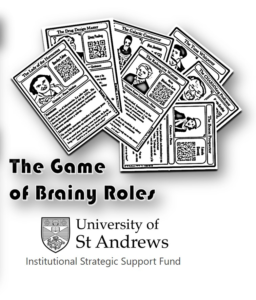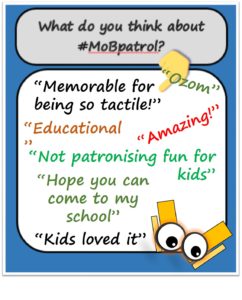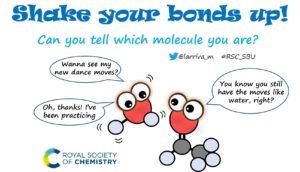Public Engagement: From Passion to Career
Maria Larriva Hormigos is Research Assistant in neuroscience, working in the Mechanism of Behaviour Group (MOB) lead by Professor Karen Spencer. However, during her time here at the University of St Andrews, Maria has made her stamp by co-creating, a public engagement card game, ‘The Game of Brainy Roles’ (#BrainyRolesGame, [email protected]). This teaches about the science  behind the neurophysiology of the stress response, whilst also demonstrating that science is for everyone. The game has 27 characters based on real people. For example, amongst the characters are scientists, musicians, footballers and artists, men and women sharing interests and willing to work together. By using everyone’s strengths and weaknesses, the game players realise that you can’t do everything alone – you will always need help and that everyone, not matter their age, gender, race, social or professional background, has a part to play in furthering scientific discovery.
behind the neurophysiology of the stress response, whilst also demonstrating that science is for everyone. The game has 27 characters based on real people. For example, amongst the characters are scientists, musicians, footballers and artists, men and women sharing interests and willing to work together. By using everyone’s strengths and weaknesses, the game players realise that you can’t do everything alone – you will always need help and that everyone, not matter their age, gender, race, social or professional background, has a part to play in furthering scientific discovery.
The development of The Game of Brainy Roles, started as a handcrafted 8-card game inspired by “Magic the Gathering”, and was first developed as a “neuROLEscience workshop” for the ELT Science Summer School 2017. From this experience, Maria was able to secure an ISSF Public Engagement grant, which allowed her to professionally produce the cards, develop a game expansion including 10 facilities and attended several conferences about Science Communication.
This led Maria to translate the game into Spanish and take the game to her hometown in Spain. This included the IES Las Musas, in Madrid, where she secured a small outreach grant from the Spanish Royal Society of Chemistry (RSEQ-STM). The idea behind this was to show secondary school kids the huge variety of research chemists could be involved and to fight stereotypes in Science and Chemophobia.
Over several visits to Spain, Maria and her colleagues have visited 4 secondary schools and speaking to over 100 students. This includes S3-S4 (“3rd and 4th ESO”); and Higher and Advance Higher (“1st and 2nd Bachillerato”) levels. Maria has also had the opportunity to teach trainee teachers at the University of La Rioja; run a workshop about the game at the Annual EUSEA Conference in Vienna in 2019, and presented the game at The XXXVII Biennial Meeting of the Spanish Royal Society of Chemistry and The Association for Science Education (ASE) teaching conference earlier this year. Because of its popularity, Maria has been invited back to where it all began – the University Summer School every year since 2017.
However, the development of this has not always been plane sailing. The first time Maria tested the game out of the classroom, it did not work at all. But through passionate support from Glasgow Science Centre’s Science learning coordinator, Mr. Sam Langford (@scottishscicomm), as well as the public engagement team here at the University, Maria found the way to make the most of that experience.
 It was during this time that Maria has found her true calling and passion. She reports that it was when she was delivering this game at the secondary schools, that something clicked. She realised that public engagement was the direction she was looking to take her career. She then took part in all the public engagement training opportunity she could, developing more public engagement activities.
It was during this time that Maria has found her true calling and passion. She reports that it was when she was delivering this game at the secondary schools, that something clicked. She realised that public engagement was the direction she was looking to take her career. She then took part in all the public engagement training opportunity she could, developing more public engagement activities.
 These activities include her “MoB Patrol” (#MOBpatrol) hands-on stall to teach children about the antibody properties using bath toys and sticky hands and “Shake your Bonds Up” (#RSC_SBU), a table top stall funded by a small outreach grant from the Royal Society of Chemistry, to teach about the way molecules “dance” under infrared radiation. Both stalls have been successful at science fairs, festivals and at the Glasgow Science Centre.
These activities include her “MoB Patrol” (#MOBpatrol) hands-on stall to teach children about the antibody properties using bath toys and sticky hands and “Shake your Bonds Up” (#RSC_SBU), a table top stall funded by a small outreach grant from the Royal Society of Chemistry, to teach about the way molecules “dance” under infrared radiation. Both stalls have been successful at science fairs, festivals and at the Glasgow Science Centre.
To help her gain the necessary skills in public engagement Maria took part in the University’s Public Engagement training Portfolio (PEP). Maria is one of the first academic staff to complete it. She said that she enjoyed every single course and found it very useful as it had lots of tips to improve her performance and ideas to include in her activities. One of the unexpected benefits of the PEP, is engaging with people across different Schools, research and background, which can help collaborate in unexpected ways. Maria says she would recommend the PEP to everyone as it was a brilliant and fun experience, and it will help you to get out of your comfort zone to get your message across – as well as it looking good on your CV and grant applications.
As a result of all her hard work and dedication to public engagement, and the development of 3 successful activities, in October 2019, Maria won a Highly Commended award at the University’s public engagement awards. The judges were impressed by the innovation of the game to engage secondary school children. They felt the project was well thought out and had achieved its clear aims, whilst still be fun and engaging.
Maria is now starting her new career as a public engagement officer at Wellcome Centre for Integrative Neuroimaging at the University of Oxford, thanks to the experiences and training she got during her time at the University of St Andrews.
Maria would like to acknowledge and thank the following people for their work, support and efforts in helping these public engagement projects:
In helping with the initial design of the Game of Brainy Roles
- Mr Paul Gardner
- Dr Paula Miles
- Dr Martines Gonzalez (Molecular Spectroscopy Group, ISIS Neutron-Muon Source, STFC)
For collaborating in the public engagement grant from Spanish Royal Society of Chemistry (RSEQ-STM)
- Dr Martinez-Gonzalez,
- Mrs Rocio Alvarez-Villalba
- Dr Maria Jose Tenorio-Serrano (University Rey Juan Carlos, Madrid)
Also a special mention to:
- Dr Mhairi Stewart – Head of Public engagement with research at the University of St Andrews
- Dr Alina Loth – Former public engagement officer at the University of St Andrews
- Mr Sam Langford – Science Learning Coordinator at the Glasgow Science Centre